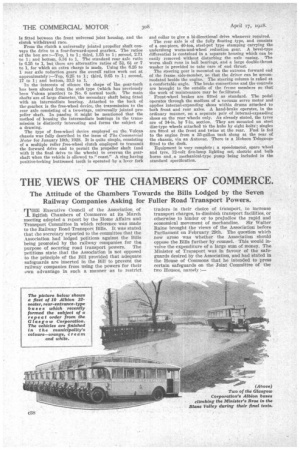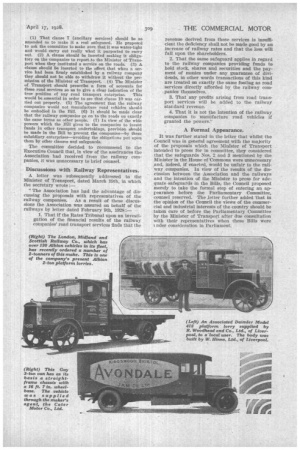THE VIEWS, OF THE CHAMBERS OF COMMERCE.
Page 60

Page 61

If you've noticed an error in this article please click here to report it so we can fix it.
The Attitude of the Chambers Towards the Bills Lodged by the Seven Railway Companies Asking for Fuller Road Transport Powers.
THE Executive Council of the Association of unBritish Chambers of Commerce at its March meeting adopted a report by the Home Affairs and Transport Committee in which reference was made to the Railway Road Transport Bills. It was stated that the secretary reported to the committee that the Association had lodged petitions against the Bills being promoted by the railway companies for the purpose of securing road transport powers. The petitions state that the Association is not opposed to the principle of the Bill provided that adequate safeguards are inserted in the Bill to prevent the railway companies from using the powers for their own advantage in such a manner as to restrict
traders in their choice of transport, to increase transport charges, to diminish transport facilities, or otherwise to hinder or to prejudice the rapid and economical movement of rnechandise. Sir Walter Raine brought the views of the Association before Parliament on February 29th. The question which now arose was whether the Association should oppose the Bills further by counsel. This would involve the expenditure of a large sum of money. The Minister of Transport was in favour of the safeguards desired by the Association, and had stated in the House of Commons that he intended to press certain safeguards on the Joint Committee of the two Houses, namely
(1) That clause 7 (ancillary services) should be so amended as to make it a real safeguard. Be proposed to ask the committee to make sure that it was water-tight and would carry out really what it purported to carry out. (2) A clause should be inserted making it obligatory on the companies to report to the Minister of Transport when they instituted a service on the roads. (3) A clause should be inserted to the effect that when a service had been firmly established by a railway company they should not be able to withdraw it without the permission of the Minister of Transport. (4) The Minister t,f Transport should prescribe a form of accounts for these road services so as to give a clear indication of the
true position of any road transport enterprise. This would be essential in order to see that clause 10 was carried out properly. (5) The agreement that the railway companies would not manufacture road vehicles should be embodied in the Bill. (6) It should be made clear that the railway companies go on to the roads on exactly the same terms as other people. (7) In view of the wide powers which the Bill gives to the companies to invest funds in other transport undertakings, provision should be made in the Bill to prevent the companies—by these subsidiary enterprises—avoiding the obligations put upon them by other clauses and safeguards.
The committee decided to recommend to the Executive Council that, in view of the as.stirances the Association had received from the railway companies, it was unnecessary to brief counsel.
Discussions with Railway Representatives.
A letter was subsequently addressed to the Minister of Transport, dated March 19th, in which the secretary wrote:— "The Association has had the advantage of discussing the proposals with representatives of the railway companies. As a result of these discussions the Association was assured on behalf of the railways by letter dated February 9th, 1928: I. That if the Rates Tribunal upon an investigation of the financial results of the railway companies' road transport services finds that tbe revenue derived from these services is insufficient the deficiency shall not be made good by an increase of railway rates and that the loss will fall upon the shareholders.
2. That the same safeguard applies In regard to the railway companies providing funds to hold stock, shares and securities and the payment of monies under any guarantee of dividends, in other words transactions of this kind are treated on exactly the same footing as road services directly afforded by the railway companies themselves, 3. That any profits arising from road transport services will be added to the railway standard revenue.
4. That it is not the intention of the railway companies to manufacture road vehicles if granted the powers."
A Formal Appearance.
It was further stated in the letter that whilst the Council was in general agreement with the majority of the proposals which the Minister of Transport intended to press for in committee, they considered that the safeguards Nos. 2 and 3 mentioned by the Minister in the House of Commons were unnecessary and, indeed, if enacted, would be unfair to the railway companies. In view of the results of the discussion between the Association and the railways and the intention of the Minister to press for adequate safeguards in the Bills, the Council proposed merely to take the formal step of entering an appearance before the Parliamentary Committee, counsel reserved. The letter further added that in the opinion of the Council the views of the commercial and industrial interests of the country should be taken care of before the Parliamentary Committee by the Minister of Transport after due consultation with their representatives when these Bills were
nder consideration in Parliament.












































































































